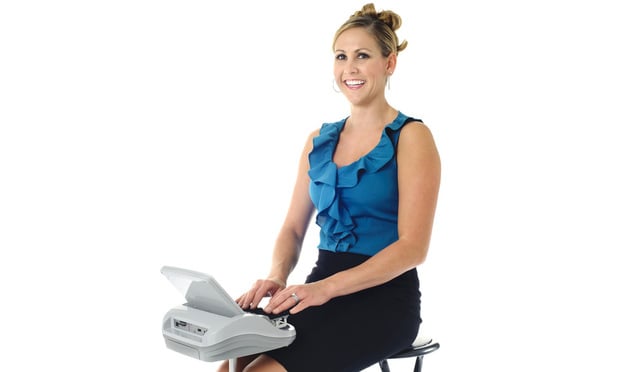Human Court Reporters Cannot Be Replaced
OP-ED: If tape recording were a better and easier way to make an accurate record with timely delivery, then court reporters would have adopted it years ago. It's not.
July 05, 2019 at 12:00 PM
6 minute read
 Photo courtesy of Certified Court Reporters Association of NJ
Photo courtesy of Certified Court Reporters Association of NJ
On May 23, 2019, the New Jersey Law Journal published an article titled: “Could Automation Be the Antidote to the Court Reporter Shortage?” The article (a/k/a infomercial for the authors) was a brilliant example of damning court reporters with faint praise, innuendo, half-truths and subliminal criticism, and written by proponents of audio-recording technology.
The stock photo accompanying the article was of a court reporter using a manual stenotype machine that was old technology in the 1950s, propped upon a desk with paper coming out of the back, sending the message that court reporting technology has just recently emerged from the days of the Industrial Revolution. The only thing missing from the photo was a smokestack belching steam from atop the writer.
Efforts are made to praise the court reporter's unrivaled typing speed. Court reporters do not type—they have never typed, even back when they used paper. The term “typing” is used to again reference a system from “back in the day.” Tape transcribers type though, one letter at a time.
The modern court reporter inputs data using a computerized device that streams information into a file on a laptop computer or tablet that immediately appears as English in a near-finished transcript format that the parties can read on their own equipment simultaneously.
The article touts the use of audio recording with artificial intelligence (AI) to help provide accurate transcription. Basically, the progression from reel-to-reel tape recorders to digital recording has not changed much over the years. A tape recorder records what it “hears,” with the hope that what it recorded is accurate and will result in an ability to create a usable product. This becomes a sort of hit-or-miss adventure when a transcript is ordered. If it's not there, the testimony is lost; if the recording is garbled or inaudible or indiscernible; if there is overlapping and simultaneous speech; if a fire engine or ambulance passes by the court house or law office; if a cough or a sneeze by someone in the courtroom, a slamming door, etc., occurs, that's what you get on the tape, and the party ordering the transcript has to pay for that sort of a transcript (at the same page rate that would be paid to a court reporter). Turn it on and hope for the best.
Unfortunately, in the New Jersey Superior Court, because of a long-standing and outmoded attrition policy instituted long ago by parties no longer here and for reasons mostly forgotten, most New Jersey courts must use electronic recording, unless they are lucky enough to have one of the remaining court reporters assigned to take the proceeding. You might want to ask the trial bar how that's been working out.
One of the main reasons for a shortage of court reporters and court reporting training here in New Jersey is due to the courts' following that attrition policy, casting a pall on a reliable career for court reporters in the state courts.
The article also attributes the current court reporter shortage to the “high barrier to entry thanks to a challenging certification process.” Is the licensing process challenging? You bet it is. New Jersey is one of 32 states that have mandated licensure to protect the consumers of this exacting and essential service. There is quite a difference between a verbatim record and an “adequate” record, whatever that might mean. Would you feel more comfortable if doctors and lawyers could practice without a license, as anyone with a digital tape recorder can?
Another reason for the current shortage is the longstanding trend in education steering students primarily toward college degrees, while neglecting the many well-paying and essential skilled professions and trades that offer young people a rewarding future and comfortable lifestyle.
Opportunities abound for students with the ongoing and increasing demand for certified court reporters in litigation discovery, the emergence of the field of closed captioning of all television programming, captioning in the area of education at all levels, and captioning of live events of all sorts nationwide mandated by the Americans with Disabilities Act for the benefit of the hearing impaired. Many people do not know that the words streaming across the bottom of their TV screen are being created by court reporters. There are huge opportunities awaiting young people in an ever-expanding field.
The good news? A solution to New Jersey's shortage has arrived. Beginning this year, Bloomfield College, through its partnering institution, Pillar College, will begin classes in their Court Reporting Education Program, at 60 Park Place, Newark, offering two certification programs.
The authors seem to suggest the cure for a legal system that “is known for its delays and slow-moving cases” and to “speed up the sluggish process” is AI-powered speech recognition to “create workable transcripts in real time.” Really? How is that working out with your cellphone's voice-to-text feature? You see the results of AI speech recognition transcription even when it is being used in a controlled one-speaker environment. At times it is very entertaining. Contrast that to using it in an open-microphone environment in a crowded courtroom with background noise, traffic noise, emergency vehicles; multiple participants, often with a staggering diversity of accents; translators speaking along with the defendant or witness; overlapping speech; soft-spoken speakers; an insufficient number of inferior microphones; courtrooms not conducive to recording, etc.
The need for a human mind to filter out the nonsense and recognize what cannot be reported without human intervention in the process is essential. As even the authors say, “human judgment is impossible to replicate.”
If tape recording were a better and easier way to make an accurate record with timely delivery, then court reporters would have adopted it years ago. It's not.
Mark H. Renzi is president of the Certified Court Reporters Association of New Jersey. He wrote this response on behalf of the CCRA-NJ Board of Directors.
This content has been archived. It is available through our partners, LexisNexis® and Bloomberg Law.
To view this content, please continue to their sites.
Not a Lexis Subscriber?
Subscribe Now
Not a Bloomberg Law Subscriber?
Subscribe Now
NOT FOR REPRINT
© 2025 ALM Global, LLC, All Rights Reserved. Request academic re-use from www.copyright.com. All other uses, submit a request to [email protected]. For more information visit Asset & Logo Licensing.
You Might Like
View All
Law Firms Look to Gen Z for AI Skills, as 'Data Becomes the Oil of Legal'



Trending Stories
- 1An Eye on ‘De-Risking’: Chewing on Hot Topics in Litigation Funding With Jeffery Lula of GLS Capital
- 2Arguing Class Actions: With Friends Like These...
- 3How Some Elite Law Firms Are Growing Equity Partner Ranks Faster Than Others
- 4Fried Frank Partner Leaves for Paul Hastings to Start Tech Transactions Practice
- 5Stradley Ronon Welcomes Insurance Team From Mintz
Who Got The Work
J. Brugh Lower of Gibbons has entered an appearance for industrial equipment supplier Devco Corporation in a pending trademark infringement lawsuit. The suit, accusing the defendant of selling knock-off Graco products, was filed Dec. 18 in New Jersey District Court by Rivkin Radler on behalf of Graco Inc. and Graco Minnesota. The case, assigned to U.S. District Judge Zahid N. Quraishi, is 3:24-cv-11294, Graco Inc. et al v. Devco Corporation.
Who Got The Work
Rebecca Maller-Stein and Kent A. Yalowitz of Arnold & Porter Kaye Scholer have entered their appearances for Hanaco Venture Capital and its executives, Lior Prosor and David Frankel, in a pending securities lawsuit. The action, filed on Dec. 24 in New York Southern District Court by Zell, Aron & Co. on behalf of Goldeneye Advisors, accuses the defendants of negligently and fraudulently managing the plaintiff's $1 million investment. The case, assigned to U.S. District Judge Vernon S. Broderick, is 1:24-cv-09918, Goldeneye Advisors, LLC v. Hanaco Venture Capital, Ltd. et al.
Who Got The Work
Attorneys from A&O Shearman has stepped in as defense counsel for Toronto-Dominion Bank and other defendants in a pending securities class action. The suit, filed Dec. 11 in New York Southern District Court by Bleichmar Fonti & Auld, accuses the defendants of concealing the bank's 'pervasive' deficiencies in regards to its compliance with the Bank Secrecy Act and the quality of its anti-money laundering controls. The case, assigned to U.S. District Judge Arun Subramanian, is 1:24-cv-09445, Gonzalez v. The Toronto-Dominion Bank et al.
Who Got The Work
Crown Castle International, a Pennsylvania company providing shared communications infrastructure, has turned to Luke D. Wolf of Gordon Rees Scully Mansukhani to fend off a pending breach-of-contract lawsuit. The court action, filed Nov. 25 in Michigan Eastern District Court by Hooper Hathaway PC on behalf of The Town Residences LLC, accuses Crown Castle of failing to transfer approximately $30,000 in utility payments from T-Mobile in breach of a roof-top lease and assignment agreement. The case, assigned to U.S. District Judge Susan K. Declercq, is 2:24-cv-13131, The Town Residences LLC v. T-Mobile US, Inc. et al.
Who Got The Work
Wilfred P. Coronato and Daniel M. Schwartz of McCarter & English have stepped in as defense counsel to Electrolux Home Products Inc. in a pending product liability lawsuit. The court action, filed Nov. 26 in New York Eastern District Court by Poulos Lopiccolo PC and Nagel Rice LLP on behalf of David Stern, alleges that the defendant's refrigerators’ drawers and shelving repeatedly break and fall apart within months after purchase. The case, assigned to U.S. District Judge Joan M. Azrack, is 2:24-cv-08204, Stern v. Electrolux Home Products, Inc.
Featured Firms
Law Offices of Gary Martin Hays & Associates, P.C.
(470) 294-1674
Law Offices of Mark E. Salomone
(857) 444-6468
Smith & Hassler
(713) 739-1250






